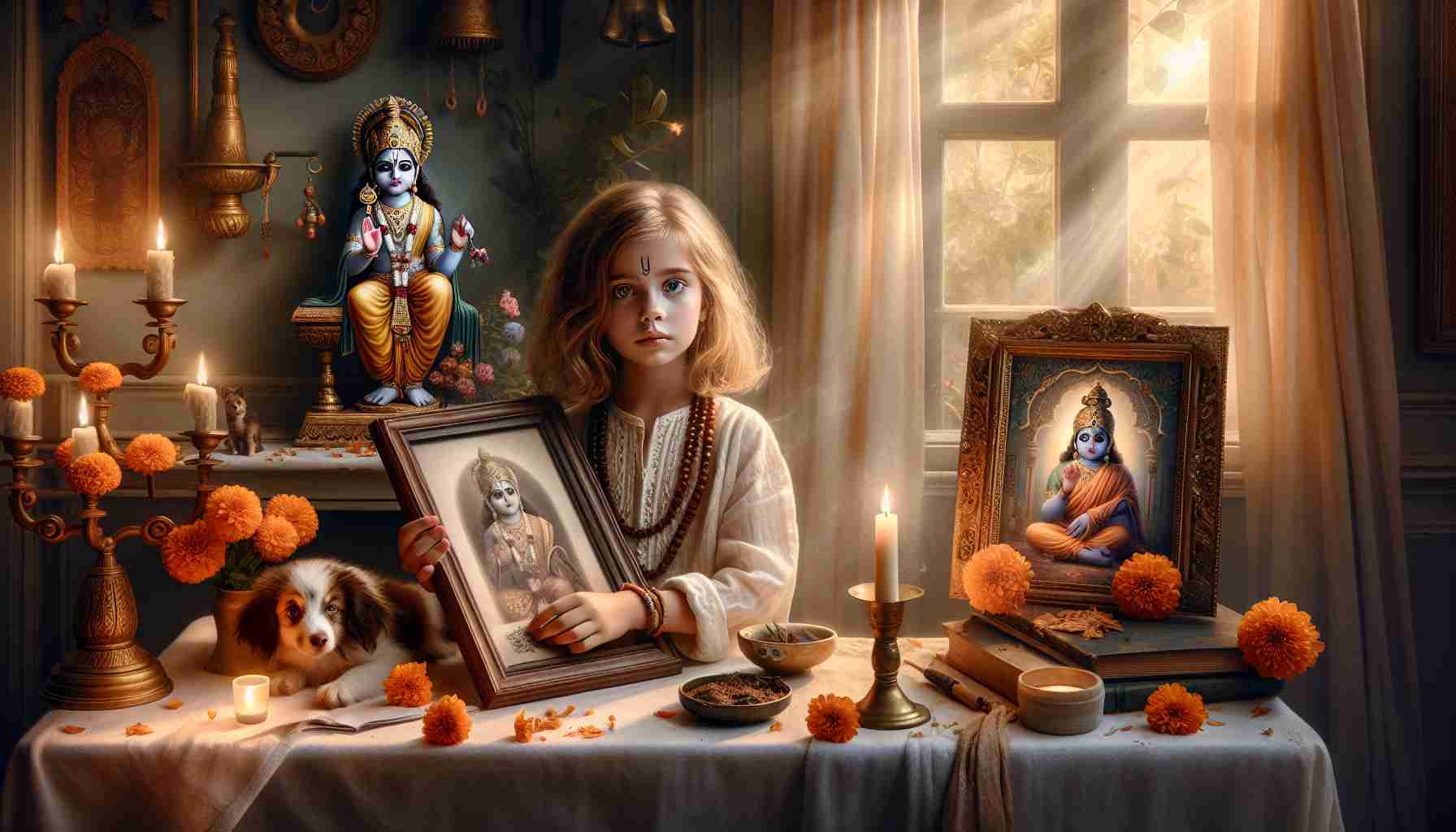

My name is Shreya. I’m the one who wraps the mala for my grandmother’s shrine, who resets her incense every morning, and now… the one who lights the lamp by her photograph.
She left us during the monsoon. The skies cried more than I did that first day. I stayed quiet, holding my breath through the rituals, through the fire, through the ashes scattering at the Triveni Sangam — the meeting place of three rivers. It felt like if I stayed still long enough, she’d walk back through the doorway, telling me my chai had boiled over again.
But she didn’t.
In those weeks, I stopped speaking to the deities on our prayer shelf. Even to Krishna, with His gentle flute and cheeky smile — the one she said could calm any storm. I didn't want calm. I wanted her.
Then one night, while folding her old sari — the pink silk one she wore for Diwali — I found a tiny note tucked inside. Just one line in her looping script:
"Jatasya hi dhruvo mrityur dhruvam janma mrtasya cha.”
I whispered it aloud. It sounded familiar. I dusted off her Bhagavad Gita and found the verse in Chapter 2, Verse 27:
"For one who is born, death is certain; and for one who has died, birth is certain."
She had marked it in yellow and scribbled beneath: So don’t cry. I'll come again.
I sat there, holding the verse against my chest the way she used to hold me when I scraped my knees. That verse — I don’t know why — felt warm.
The Upanishads speak of the atman — the soul — as eternal, untouched by fire or water. I remember her explaining it using the Taittiriya Upanishad: "We are more than the body, Shreya. We are light wrapped in skin."
Still, I missed her laugh. I missed the way she hummed bhajans while chopping onions. The ache didn’t vanish overnight, but it softened, like dough left resting.
A week later, I was feeding stray dogs outside our building, a chore she’d left to me. One tiny pup — skinny, brown, with big eyes — looked up at me with the exact same tilt of the head she used when teasing me: "Are you really going to wear that? Again?"
My breath caught. I knew it wasn’t her. But the love — oh, the love — felt so tender and familiar, I laughed for the first time in weeks.
In the Ramayana, when Sita is taken from the Earth at the end, Rama watches but does not stop her. Because he knows the soul returns, again and again, until its truth is fully known.
That day, I offered flowers not to her photo, but to the knowing that she had moved onward — not gone, just elsewhere for now.
And every time I whisper, “Come back soon, daadi,” I hear my heart reply: “I never really left.”
My name is Shreya. I’m the one who wraps the mala for my grandmother’s shrine, who resets her incense every morning, and now… the one who lights the lamp by her photograph.
She left us during the monsoon. The skies cried more than I did that first day. I stayed quiet, holding my breath through the rituals, through the fire, through the ashes scattering at the Triveni Sangam — the meeting place of three rivers. It felt like if I stayed still long enough, she’d walk back through the doorway, telling me my chai had boiled over again.
But she didn’t.
In those weeks, I stopped speaking to the deities on our prayer shelf. Even to Krishna, with His gentle flute and cheeky smile — the one she said could calm any storm. I didn't want calm. I wanted her.
Then one night, while folding her old sari — the pink silk one she wore for Diwali — I found a tiny note tucked inside. Just one line in her looping script:
"Jatasya hi dhruvo mrityur dhruvam janma mrtasya cha.”
I whispered it aloud. It sounded familiar. I dusted off her Bhagavad Gita and found the verse in Chapter 2, Verse 27:
"For one who is born, death is certain; and for one who has died, birth is certain."
She had marked it in yellow and scribbled beneath: So don’t cry. I'll come again.
I sat there, holding the verse against my chest the way she used to hold me when I scraped my knees. That verse — I don’t know why — felt warm.
The Upanishads speak of the atman — the soul — as eternal, untouched by fire or water. I remember her explaining it using the Taittiriya Upanishad: "We are more than the body, Shreya. We are light wrapped in skin."
Still, I missed her laugh. I missed the way she hummed bhajans while chopping onions. The ache didn’t vanish overnight, but it softened, like dough left resting.
A week later, I was feeding stray dogs outside our building, a chore she’d left to me. One tiny pup — skinny, brown, with big eyes — looked up at me with the exact same tilt of the head she used when teasing me: "Are you really going to wear that? Again?"
My breath caught. I knew it wasn’t her. But the love — oh, the love — felt so tender and familiar, I laughed for the first time in weeks.
In the Ramayana, when Sita is taken from the Earth at the end, Rama watches but does not stop her. Because he knows the soul returns, again and again, until its truth is fully known.
That day, I offered flowers not to her photo, but to the knowing that she had moved onward — not gone, just elsewhere for now.
And every time I whisper, “Come back soon, daadi,” I hear my heart reply: “I never really left.”